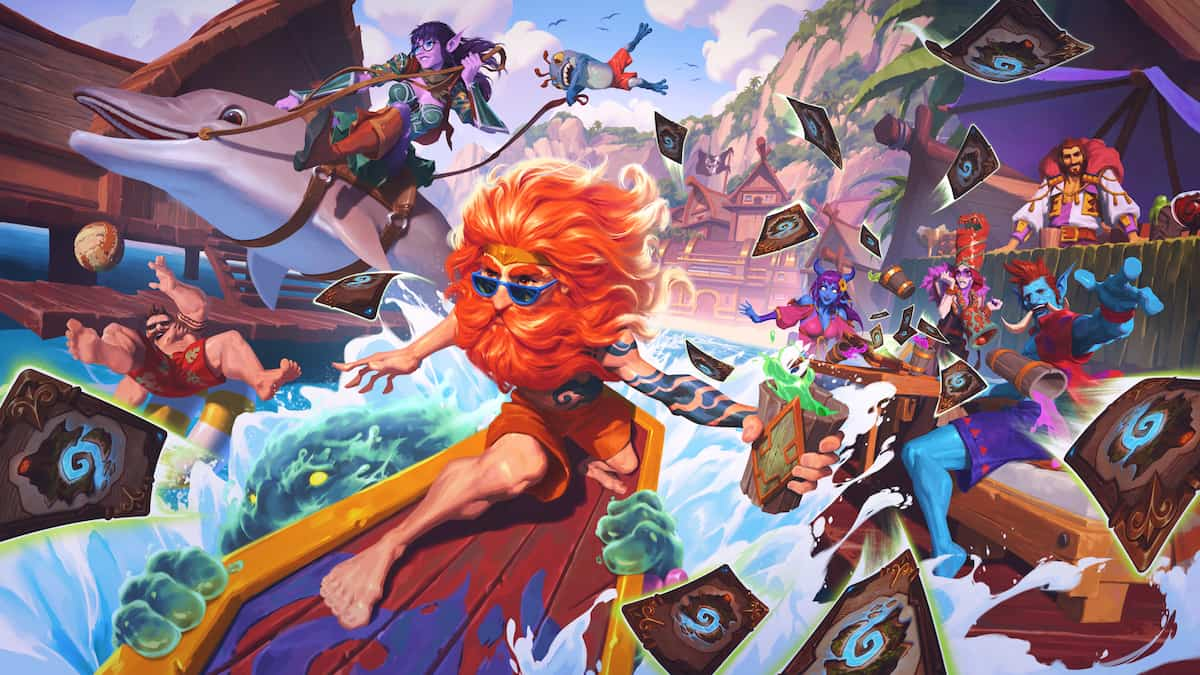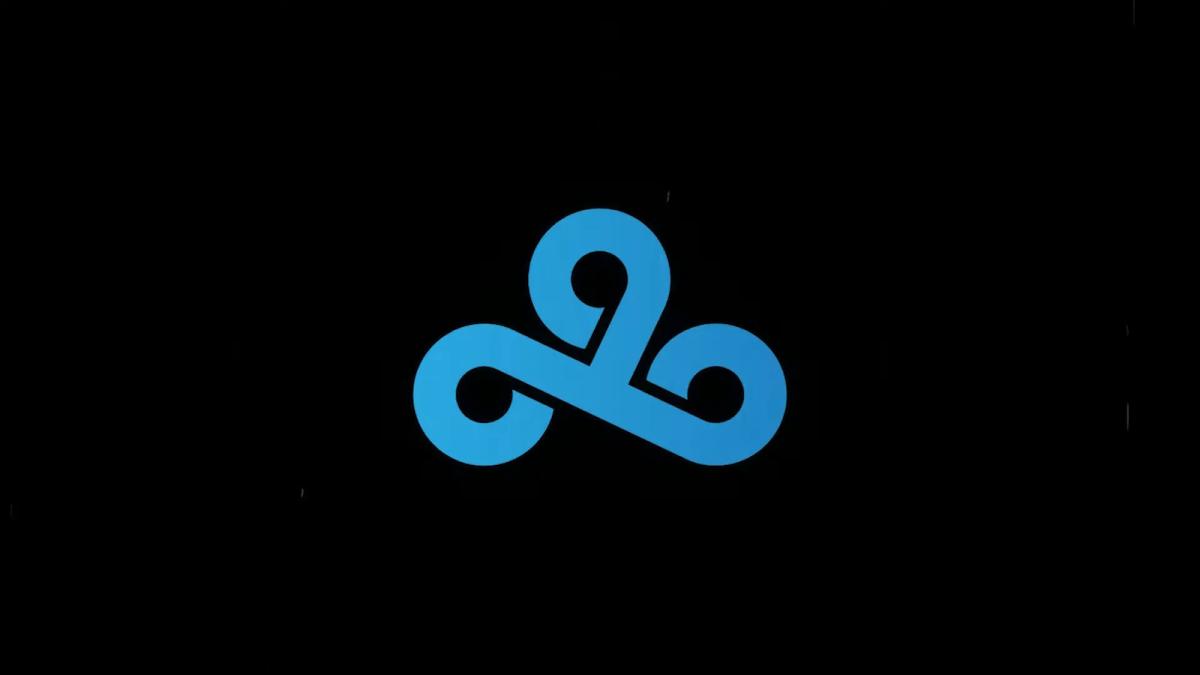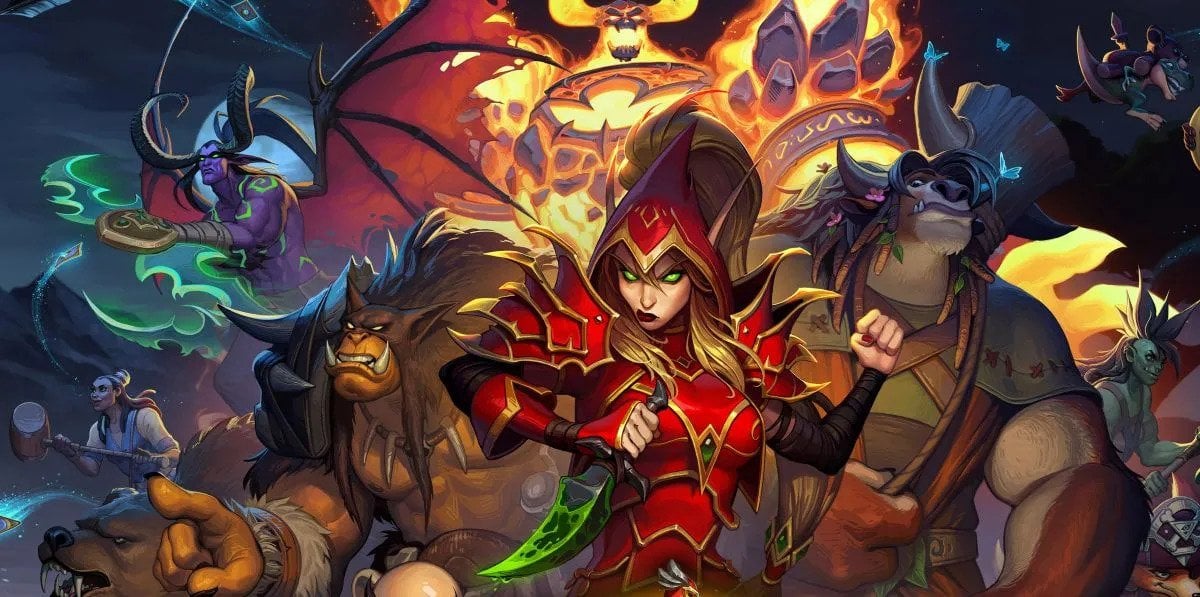For each of the 16 players who made it, being part of the first ever Hearthstone World Championships meant something different.
The journey from all across the world the road to Anaheim, California has been grueling, but the toughest part of the competition is just beginning. The pressure is enormous. As many as 160,000 people are watching the stream at any given time, and hundreds of people are spectating in person at the convention. The winner will take home a cool $100,000, while the people who fail to make it out of the groups will pocket just $5,000.
The players are preparing for the tournament in different ways: some have brought their coaches, some have brought their families. For one player in particular the journey to this point has been an improbable whirlwind. Though he might not end up as the world champion, just being allowed to be in Anaheim in the first place is a victory—even if he did have to bring his homework with him.
James “Greensheep” Luo is almost certainly the youngest pro player in Hearthstone. At just 16 years old he has competed at multiple DreamHack tournaments and is signed to one of the biggest organisations in esports, Dignitas.
As competitive gaming gets bigger, schools will have to continue to evolve their understanding of esports.
Alongside all of this excitement Luo is still trying to get an education. A year away from his crucial A Level exams—which will determine whether he gets accepted to college—he’s finding it harder and harder to be allowed time off for tournaments.
Recent trips to DreamHack, one of the largest gaming and esports festivals in the world, and iSeries, another Hearthstone tournament in the UK, have taken him over the limit for absences. “I was considering leaving school,” Luo explains. “I think there was a possibility they could have kicked me out. I think I’ll probably have to do some extra lessons and extra homework, which I’m willing to do. If it means I can go to events and stay in school, I’d be willing to do anything.”
A former top level player in the Pokemon collectible card game, Luo came to Hearthstone through playing League of Legends, and seeing some of favorite his League pros playing the game. After getting an early beta key, he began playing in weekly cups and online tournaments. When fellow British player Nick “CookMySock” Li hinted that Dignitas were looking for a Hearthstone team and Luo may be on their radar Luo’s reaction was to push for not only himself to be signed—instead, he lobbied the team to sign himself and his Swedish friends and team mates.
“We were really good friends,” he says. But Luo’s journey into the top tiers of professional Hearthstone would have to be by himself. “At first I tried to ask [Dignitas’ team manager] Odee to sign our entire team,” he says. “But unfortunately he was only looking for UK players.”
He’s hardly the only teenager playing at the top levels of esports, however. As esports continues to evolve and develop, schoolkids are becoming more prominent in a scene that is dominated by youth, presenting challenges for an education system used to punishing kids for playing too many videogames—not supporting them.
A fairytale ending was not in the cards.
In Hearthstone alone, Luo is by no means the only one balancing gaming and the classroom — Romanian Dima “Rdu” Radu, one of the game’s most successful players to date, is just 17. During a particularly bloated tournament schedule this past September, Radu competed in tournaments that were taking place through the night in his time zone before going straight to school on no sleep.
High school esports has existed for a few years in other games. Organizations like the High School Starleague (HSL) supports school kids in setting up esports clubs and teams within their schools and offers them opportunities to compete nationwide. This year HSL offered scholarships worth $20,000, with a number of universities themselves starting to offer sports scholarships in the same way they would to any other sport.
As competitive gaming gets bigger, schools will have to continue to evolve their understanding of esports. They may need to soon offer days off esports competitions in the same way they do football games and athletic meets. Similarly, esports teams may well need to up their level of responsibility and involvement in their players’ education—like child film stars or pop starlets, esports teams could well soon have private tutors on staff to make sure that players can get an education while competing to the best of their ability.
For now, however, school-age pro gamers like Luo face an uphill battle to make their teachers even understand what it is they do, let alone get their support.
After signing with Dignitas in August, Luo really broke out with his performance at the World Championship EU qualifiers. In the online stage, Luo fought back from two early losses to only narrowly lose to one of Europe’s best, 20 year old Thijs “ThijsNL” Molendijk, in the final game. Due to dropouts, however Luo was invited to the second stage at DreamHack Stockholm on just a few days notice.
“I had to tell school all about it,” he says. “They were fine with it in the beginning, because I told them all about it and how big the opportunity was and it was the first time I had taken days off school in years.”
“If it means I can go to events and stay in school, I’d be willing to do anything.”
After rematching Molendijk in the first game and managing to come out on top this time, Luo displayed a calmness beyond his years and advanced to the World Championship finals. When he told his school that he was going to the World Championships, Luo says they were “pretty excited, because I told them how big this opportunity was.”
Aside from the World Championships, Luo has also been invited to other major tournaments. He was given the opportunity to attend both DreamHack Winter and Insomnia53—which were both taking place in the same week.
“DreamHack Winter started to make things more difficult,” Luo explains, “as I also was going to Insomnia53 down in Coventry, so I actually had to take four or five days off school. I think the school were a bit unhappy, a few teachers were unhappy that I was missing so much time.”
Of course, school teachers aren’t the only people Luo has to contend with. His parents also took some convincing to let him pursue this dream.
“Of course at first they didn’t really like it,” Luo said. “When I explained it they wanted to learn about esports more, and once I got into the World Championships they started looking at it in a different way.
“They want me to try really hard to become a professional, and they always talk to me about what mindset I should have when I’m going into games and they support me.”
Just being allowed to be in Anaheim in the first place is a victory — even if he did have to bring his homework with him.
After all the challenges and hurdles Luo has had to jump through, a fairytale ending was not in the cards for him at the World Championships. After losing his first two matches against Jiahui “Qiruo” Wang of China and Seung-Ha “Kranich” Choi of Korea, Luo was eliminated at the first hurdle. The winner of his group, James “Firebat” Kostesich, went on to become the eventual winner. Luo could only watch from the sidelines.
“I was so distraught after it,” he said. “I was quite sad for the first two days but after that I was fine, I just enjoyed the rest of time at Blizzcon which was amazing. I just tried to support all the other people that were there.”
So for now, Luo is back to balancing the demands of both school and pro gaming. With no LAN events on the horizon in the near future the threat of having to leave has somewhat subsided for now. But that could easily change in the New Year.
“They’ve given me the opportunity to stay and play Hearthstone at the same time,” Luo says. “But if it came to a point where a really major event that I could not miss going to would lead to me getting kicked out of school, then I’d probably have to think about it a bit more.
“At the moment, options are still open.”
Photo via DreamHack/Flickr






Published: Dec 23, 2014 11:35 am